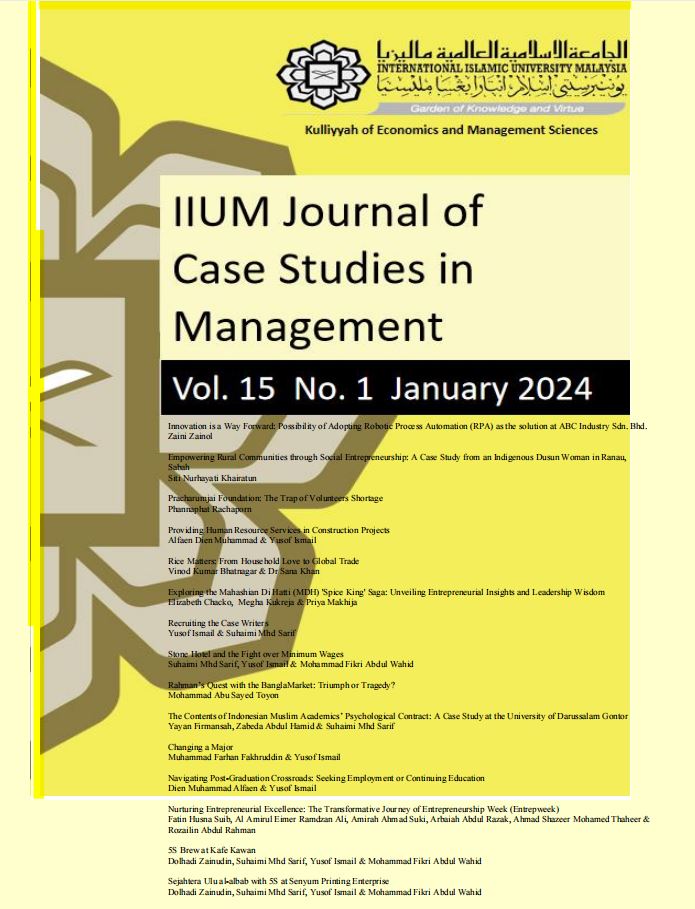About the Journal
Aim and Scope of the Journal
The IIUM Journal of Case Studies in Management is an internationally refereed journal published twice yearly (January & August) by the Kulliyyah of Economics and Management Sciences, International Islamic University Malaysia.
The journal promotes case studies in the field of management. However, the editorial committee may receive a case study that is superficially related to “management” (MG), whereas its contents are directly related to another discipline. For example, a case study on “Financial Management” (FM). It is more linked to finance than management because the case contains a core issue on finance or financial management, not management. The word “management” in FM does not change the FM discipline to MG. FM is not MG, and vice versa but the two disciplines can be inter-related. To make the FM case fit the journal, the case author must reshape it towards “management” although the core issue of finance or FM remains.
The same explanation can be offered, for instance to “Marketing” or “Marketing Management” (MM). The word “management” in MM does not change the discipline of MM to MG. To make the MM case fit the journal, the case author must reshape it towards “management” although the core issue of marketing or MM remains.
Case studies provide certain educational objectives. While academic papers are more inclined towards enhancing knowledge and understanding in the areas, case studies inculcate applied-based learning and the acquisition of (problem-solving and decision-making) skills. In management, textbooks normally publish decision-making or problem-solving case studies.
The cases can be used by instructors, trainers, coaches, and students in certificates, diploma, bachelor, master’s in business administration, business management, or similar programmes. They may also be used for training and executive development.
Authors are highly encouraged to submit cases that deal with management issues in the Asia-Pacific region.
Currently Indexed by:
Google Scholar; i-Journals; i-Focus; MyCite.
Publication Charges:
There are no charges for submission of a manuscript as well as no charges for article processing or publication.
Ethical Statement:
The manuscript must represent the original work by the author(s). None of the material should be covered by any copyright; if copyrighted material exceeds approximately 100 words from a journal article or approximately 500 words from a book, the author has to obtain written permission for its use. Further, this work should not infringe any intellectual property rights/secrecy laws of any person/organization/government/public or private agency, nor should it contain any defamatory matter.
IIUM Press does not bear any responsibility for verifying copyright permissions provided by the author. Any breach of copyright laws will result in retraction of the published manuscript as well as reporting to relevant authorities in the authors' institutions.
Privacy Statement:
The names and email addresses entered in this journal site will be used exclusively for the stated purposes of this journal and will not be made available for any other purpose or to any other party.
Disclaimer: Opinions expressed in articles and creative pieces published in this Journal are those of the authors and do not necessarily reflect the views of the editors, the editorial board or the publisher.
Current Issue

Community-centric enterprises that incorporate Sejahtera principles focus on holistic wellbeing and sustainable development. These businesses prioritize the welfare of the community, balancing economic growth with social and environmental responsibilities. Sejahtera, a concept rooted in harmony and balance, guides these enterprises to operate in ways that support and uplift the local community, ensuring that their activities contribute positively to the overall quality of life. This approach often includes ethical practices, community engagement, and initiatives that foster social, economic, and environmental sustainability.
Articles
Indexed in i-Journals and i-Focus




